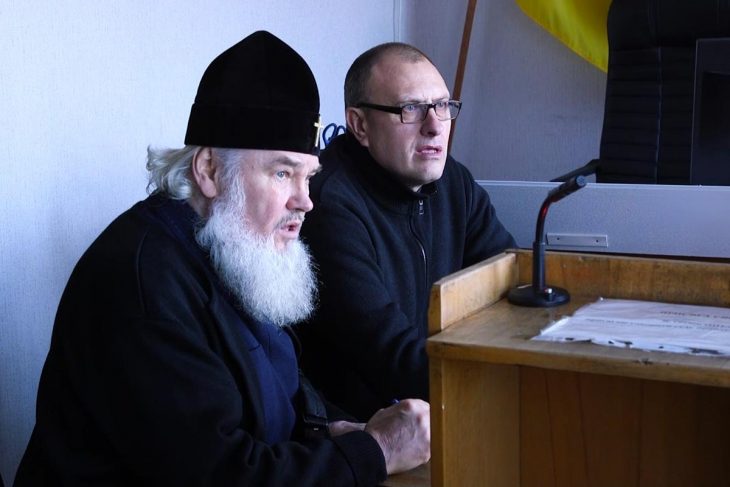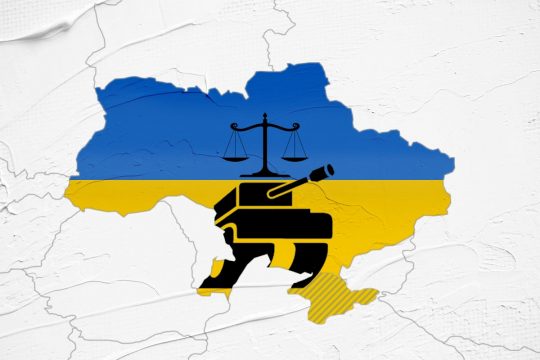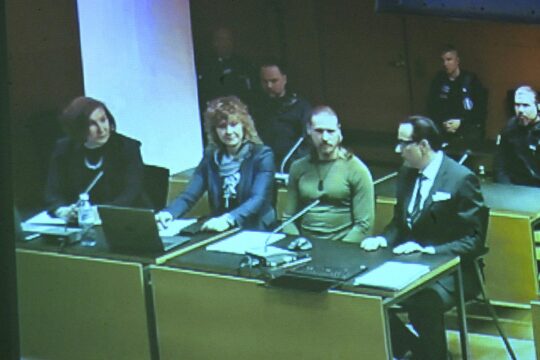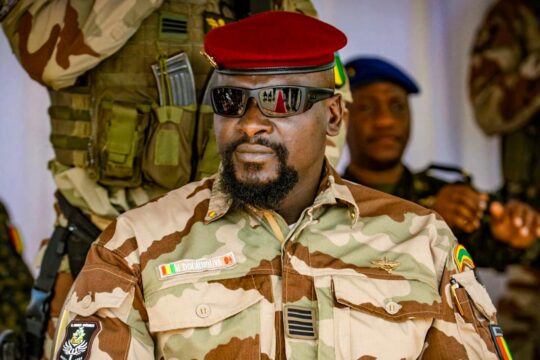Metropolitan Joasaph of Kirovohrad and Novomyrhorod, influential head of the Kirovohrad Diocese of the Ukrainian Orthodox Church-Moscow Patriarchate (UOC-MP), who consecrated churches built by local businessmen and politicians and used to attend almost all government events, recently found himself in a tiny hall of the district court surrounded by TV cameras and journalists. On December 9, the Leninsky Court of Kropyvnytskyi – the capital city of Kirovohrad region – considered a motion to impose a pre-trial restraint on Joasaph for the duration of the pre-trial investigation. Usually in Ukraine, "support groups" and guarantors are present at the trials of famous personalities, but despite the fact that the hearing was widely known, only a lawyer came with Joasaph.
Somewhat ironically, the domes of the local church, which is subordinated to the UOC, can be seen from the window of the court’s 5th floor, where the hearing was held. Despite having "Ukrainian" in the name, it is called the Moscow Patriarchate because of the connection with the Russian Orthodox Church. Since December 2018, the Orthodox Church of Ukraine (OCU) has established that is independent from Moscow’s Patriarchate, although Russia does not recognize it.
With the beginning of the full-scale Russian invasion, Ukraine’s president Volodymyr Zelensky enacted the decision of the National Security and Defence Council to ban the activities in the country of “religious organizations affiliated with centres of influence in the Russian Federation”, like the UOC. The Security Services of Ukraine (SBU) conducts security measures and searches in the churches of the UOC-MP throughout the country, where it has found Russian passports or pro-Russian literature. Some representatives of the church are accused of aiding the Russian army.
Alleged links to Patriarch Kirill
In October, searches were conducted in Kirovohrad region and at the head of the Kirovohrad diocese of the UOC-MP. The press service of the SBU issued a press release claiming that Metropolitan Joasaph is close to Russian Patriarch Kirill – who is widely known as a supporter of Russian president Vladimir Putin – and coordinated with him the spread of pro-Kremlin views in the region. Among other things, the searches revealed correspondence between Joasaph and Kirill and seized a large number of anti-Ukrainian materials produced in Russia. These materials, according to the SBU, were actively distributed among the clergy and believers to form among them positions favourable to the aggressor country.
Shortly after the searches, Joasaph resigned from his leadership position in the Diocese at his own request due to health reasons and received the rank of Metropolitan of Vasylkiv and the title of vicar (an assistant bishop or deputy bishop) of the Kyiv Metropolis. On December 2 Joasaph, whose civil name is Petro Huben, received a notice of suspicion of committing a crime under Art. 161 of the Criminal Code – that is, intentional actions aimed at inciting national, regional, racial or religious hatred and enmity, humiliation of national honor and dignity, or insulting the feelings of citizens in connection with their religious beliefs. And on December 9, at the third attempt (previous hearings were postponed due to problems with electricity supply caused by Russian shelling of the Ukrainian energy system), the court presided by Judge Kateryna Yurieva considered the request of the prosecutor from the Kirovohrad Regional Prosecutor's Office to impose a pre-trial restraint on the priest for the duration of the investigation.
Prosecutor Serhiy Ozhog asked the court to impose house arrest on the suspect and briefly listed the risks that may arise in the case of an alternative measure. In particular, he stressed that the suspect may hide from the investigation, influence witnesses and experts in the case, commit another criminal offence.
“Have mercy”
The priest’s lawyer Serhiy Halushko objected to the request and asked the court for an alternative pre-trial restraint in the form of personal commitment. Halushko pointed out that his client appeared for interrogations with investigators, came to all court hearings, and that by his behaviour he proved he cooperates with the investigation and does not intend to hide. The lawyer also stated that Joasaph has no influence on the experts, in particular from the SBU, and that the witnesses have already been interviewed so he cannot change their testimony -- although according to the law witnesses are also questioned by the court during the trial.
Halushko said that the investigators only drew attention to the materials which can be interpreted to the detriment of his client, while ignoring numerous examples of charity, assistance to Ukraine’s Armed Forces, internally displaced people and the needy. "The defendant is not convicted, he is a lonely man without family and friends. And now to lock him up alone at home, how should he live? He needs to buy medicine and go to the store. In addition, the person is in such psychological state that I think it is quite problematic to lock him up at home. My client is a priest. These persons attend church all their lives to receive communion and confession. My client has been attending church all his life. To take it away from him is cruel to a person who has been giving his life to God," the lawyer said. He called on the judge "to have mercy".
He also brought a pile of medical documentation to confirm his client's health status, asking the court to "humanely" read it. However, the judge said she would only consider the certified medical certificate, noting that it is enough.
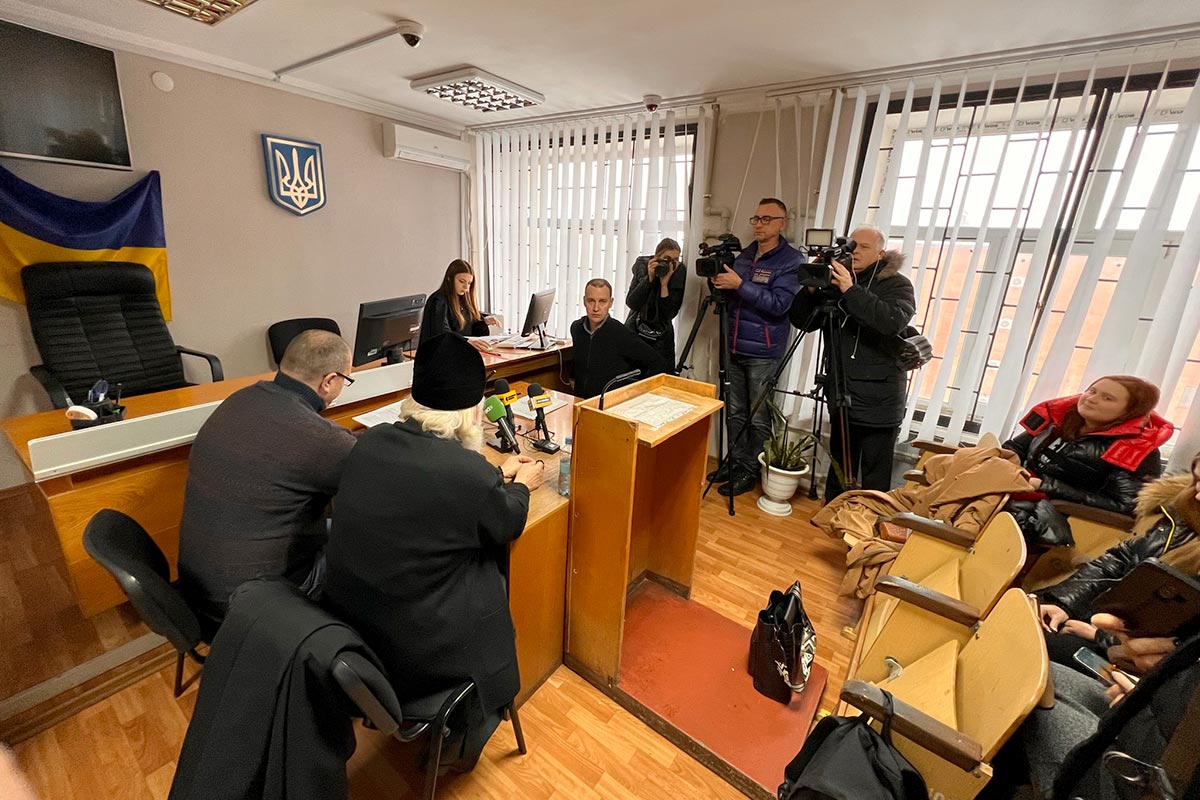
Denying supporting Russia’s invasion
When considering the materials filed in the proceedings, the judge asked the parties what information could be disclosed in view of the secrecy of the investigation and the presence of the media. The parties agreed that only the numbers of the protocols could be mentioned without detailing the content. It is known that there are six witnesses in the case.
When the judge went to the conference room to prepare the ruling, journalists managed to talk to the suspect and his lawyer, who had previously refused to comment on anything. This time, they answered most questions, denied supporting Russia's actions and stressed that an appeal to stop the aggression was published on the Internet at the beginning of the invasion.
The press was most interested in Joasaph's communication with Patriarch Kirill, who is known for his support of Russian aggression against Ukraine. After the SBU searches, it became known that the priest had letters from the Moscow Patriarchate and Kirill himself, in which the latter thanked Joasaph for his greetings, dated February 2022. (The Russian invasion attempt started on February 24.)
"Do you communicate with Patriarch Kirill?" journalists asked.
"There is information on the Internet that Bishop Joasaph is close to Patriarch Kirill," the lawyer first said.
"Yeah, an illegitimate son," Joasaph scoffed.
"Where did this information come from?" the lawyer continued.
"So you deny it?" a journalist asked.
"Of course I deny it,” Joasaph said, explaining he couldn’t be close to Kirill considering his rank. “We only went with him once on a pilgrimage trip to Novgorod and other cities. Not only the Kirovohrad Eparchy was there, but also Vinnytsia’s and Zhytomyr’s. These were official invitations [and] it was in 2019, before the war," said Joasaph.
Old material
The lawyer claimed that the Moscow diocese sends such letters to all representatives of Orthodox churches, and therefore it is not surprising. He denied his client sent letters to Russia. He stressed that Joasaph recorded an appeal to Putin with a request to stop the war.
As for the framed picture of Joasaph with the Russian patriarch, which was distributed by the press service of law enforcement agencies, the lawyer stressed that it was an old photo.
"You are trying to accuse me of something. Do you know when that photo was taken at all? In 2009,” said Serhiy Halushko. “And what was he supposed to do with it? Did he put it on display somewhere? He just keeps it at home. They were photographed in the Pochayiv Monastery in 2009 because then at the state level there was a meeting of Patriarch Kirill on our Ukrainian land." The journalists also asked him to explain the presence of St. George's ribbon, which is banned in Ukraine, at Joasaph’s home, according to searches by the SBU. The Metropolitan only said that his father had served in the Soviet army and went through the war with such a ribbon.
In the SBU press release, it is said that Joasaph is suspected of spreading pro-Kremlin views and coordinating his actions with Patriarch Kirill. However, the article in the indictment refers to a “violation of citizen’s equality based on their religious beliefs”. Could he have said something about the autocephalus OCU that led to such violation of citizen’s equality? “You answered your question. Yes, I did,” Joasaph replied.
Pro-Russian literature
As for the books seized from the cleric during the searches, the lawyer denied that they were by Russian authors and made in the Russian Federation, claiming that they were printed in Kropyvnytskyi, that these are brochures of Greek representatives of the church and there is nothing terrible in them.
The photos, which were distributed after the searches at the priest’s home, show the book "Modern Ukrainian Question" by Cypriot Metropolitan Nikiforos, a cleric who opposed the granting of autocephaly to the Orthodox Church of Ukraine and supported Russia. Another publication, "Ukrainian Church Question" by Greek Bishop Seraphim, among other things justifies Russian aggression and annexation of Crimea. Joasaph also kept books by Andriy Novikov, the former secretary of the Odesa Diocese of the UOC, who fled to Russia in 2014 and now supports the Russian aggression.
The former head of the Kirovohrad diocese also kept the publication "Ukrainian Lawlessness and Redistribution", authored by Valentin Katasonov, a Russian economist associated with the Strategic Culture Foundation, which is covertly run by the Russian state and identified by the US State Department as a source of conspiracy writings and disinformation.
While keeping such pro-Russian literature, Metropolitan Joasaph insisted that he does not support Russia’s aggression and proved it by his actions.
After considering the petition of the prosecutor and the defense lawyer, Judge Kateryna Yurieva decided to impose on the suspect a pre-trial restraint in the form of night house arrest, that is, from 22.00 to 6.00. (In Kropyvnytskyi, the curfew is in effect from 23.00 to 5.00.) Joasaph also has to come to the investigators’ office and hand over his passports to immigration services.
After hearing the judge's decision, Bishop Joasaph crossed himself, thanked the judge and wished health to all present. The lawyer indicated that they would not appeal the preventive measure. The prosecutor said he would make a decision after reading the full text of the decision.
This report is part of our coverage of war crimes justice produced in partnership with Ukrainian journalists. A first version of this article was published on the « Gre4ka » website.


